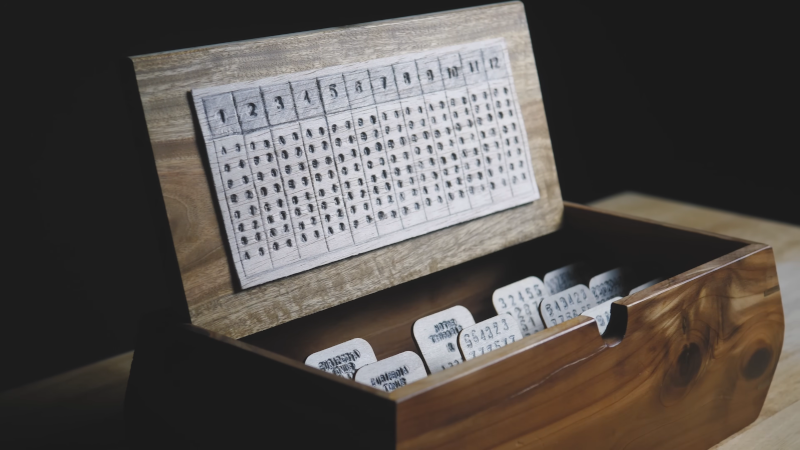We don’t think of computers as something you’d find in the 17th century. But [Levi McClain] found plans for one in a book — books, actually — by [Athanasius Kirker] about music. The arca musarithmica, a machine to allow people with no experience to compose church music, might not fit our usual definition of a computer, but as [Levi] points out in the video below, there are a number of similarities to mechanical computers like slide rules.
Apparently, there are a few of these left in the world, but as you’d expect, they are quite rare. So [Levi] decided to take the plans from the book along with some information available publicly and build his own.
The computer is a box of wooden cards — tablets — with instructions written on them. Honestly, we don’t know enough about music theory to quite get the algorithm. [Kirker] himself had this to say in his book about the device:
Mechanical music-making is nothing more than a particular system invented by us whereby anyone, even the ἀμουσος [unmusical] may, through various applications of compositional instruments compose melodies according to a desired style. We shall briefly relate how this mechanical music-making is done and, lest we waste time with prefatory remarks, we shall begin with the construction of the Musarithmic Ark.
If you want to try it yourself, you won’t need to break out the woodworking tools. You can find a replica on the web, of course. Let us know if you set any Hackaday posts to music.
We know not everyone thinks something mechanical can be a computer, but we disagree. True, some are more obvious than others.
















I wonder if all the possible outputs from the algorithm are in the in the “all the music” datasets.
From the description of what the arca does, although any melody would likely be within the all the music datasets, thats not really its primary function. The arca is made to create harmonies, which probably will put it mathematically outside of everything all the music does. (but its possible my understanding of all the musics complexity is lacking)
A good way to explain the difference in melody and harmony is with a group of kids singing happy birthday.
-The melody is what you have memorized when you sing it to yourself.
-The harmony would be each kid naturally hearing how everyone else is singing and changing the pitch of their voice to make it sound more complex and full.
Harmonys are not really something that are going to be copyrightable, or at least not something Miley Cyrus is nearly as likely to be sued for than a melody. A melody is what you remember and attaches you to a song. A harmony is what you feel in the moment while the song is played. Kinda at least.
this… might be a definition of harmony, but it doesn’t have much to do with the common practice period definition of harmony, which is what most people (and certainly anyone concerned with copyright) is going to be thinking of.
The name of the guy is Athanasius Kircher, see https://de.wikipedia.org/wiki/Athanasius_Kircher
“be proficient at driving a stick shift.“
This is a basic skill that is part of the driving test in many countries, and not at all arcane. I realise with electric cars the skill will eventually perish, but at the moment it is very much still required. You’re not driving, unless you can drive a manual transmission.
Why is this relevant in the discussion of a harmony algorithm?
Besides, it is only as useful as the chance you will encounter a stick-shift. I have no idea how to bring a steam engine up to speed either, so why should I know how to do something that a microcontroller does better?
Unclear, maybe replying to another page?
Seems you missed the utility of concretely understanding more about what your vehicle is doing when gears shift, which applies to automatics even with different great arrangements. I don’t currently own a manual, btw.
Also, comparing the availability of manual transmissions to steam power is ridiculous. Electric vehicles only make up ~1.4 percent on the road. In the US you won’t find actual statistics manual transmissions on the road, only current sales, which are overall ~3% but vary widely by model and year. Even without factoring sports cars some current models are selling 30% manual transmissions even last year. Dropping sales only make them less common, not rare, somewhere between 5-10% overall. I’m not discounting the drop, just your inane reason to avoid knowing a simple skill.
Outside the US is different. In the EU averaging 50% including new sales, varying by country. In China it’s also close to 50% including new sales, they import a lot of manual vehicles usually.
The first computers were organic.
Came here to say this. The Arka isn’t the computer; the user is. Furthermore the Arka is the algorithm (for any imperfection we may today perceive it as having).
*Arca
Also, wow, what an incredible idea, and what a well-executed video, and good write up! Thank you :D